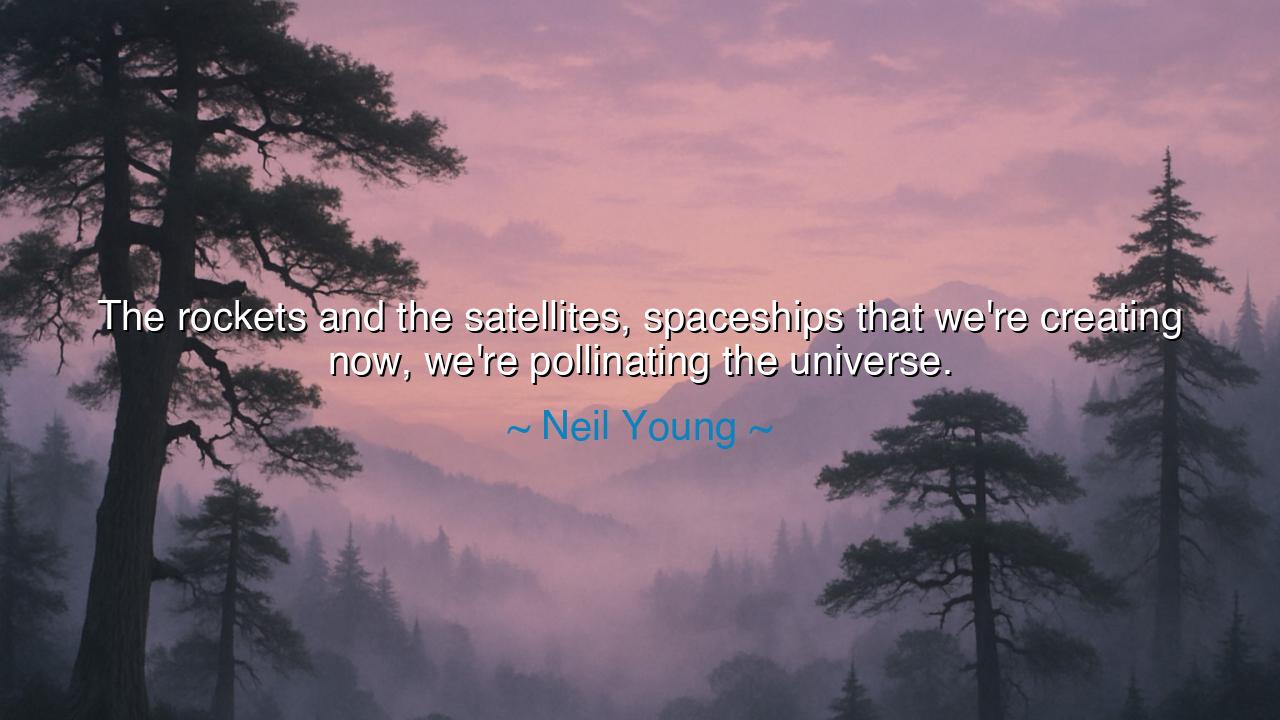
The rockets and the satellites, spaceships that we're creating
The rockets and the satellites, spaceships that we're creating now, we're pollinating the universe.






In the vast expanse of space, where the stars twinkle as silent witnesses to the unfolding story of the universe, there lies a profound truth that echoes through the words of the legendary Neil Young: "The rockets and the satellites, spaceships that we're creating now, we're pollinating the universe." These words, spoken in the midst of technological advancement, carry with them a vision of humanity as caretakers of the cosmos, spreading the seeds of our presence beyond the confines of Earth, much like the ancient seeds of life that were carried by the wind or the ocean currents to new shores. It is an image of expansion—a reaching out into the unknown, not to conquer, but to create, to leave our mark on the stars, and to fulfill a deeper, more cosmic purpose.
In the ancient world, exploration was not just the seeking of new lands, but the spread of ideas, culture, and, in many cases, the search for a new home. The Phoenicians, renowned for their voyages across the Mediterranean, were not merely traders—they were the first pollinators, bringing with them knowledge, art, and the seeds of civilization to the distant shores they encountered. The Greeks too, in their expansion of influence across the ancient world, carried with them not just their language and wisdom but the very ideas that would shape the future. Similarly, Neil Young's words suggest that space travel is the modern equivalent of that ancient endeavor—not a mere search for new lands, but the spreading of the very essence of who we are as a species.
The metaphor of pollination brings to mind the natural world, where plants rely on the wind, the bees, and the birds to carry their seeds across vast distances. These seeds, once planted in fertile soil, have the potential to create new life, to expand the reach of the species that bore them. In much the same way, rockets and spaceships are the vehicles that carry the seeds of humanity to the farthest reaches of the cosmos. As we send our satellites, our spacecraft, and eventually our colonies into the void, we are not simply exploring; we are engaging in a kind of cosmic gardening, preparing the ground for future generations of life to grow in new worlds.
Consider, for example, the mission of NASA’s Apollo 11. When Neil Armstrong and Buzz Aldrin set foot on the moon, they did not merely plant a flag in lunar soil; they left behind the first human imprint on another celestial body. The moon, once a silent observer of Earth’s history, now carried the presence of humanity. That moment marked the first act of cosmic pollination—a symbol of our potential to expand beyond our home planet. Armstrong’s iconic words, "That's one small step for man, one giant leap for mankind," remind us that space exploration is not just a journey to conquer but a journey to plant the seeds of a new beginning.
In our modern age, the idea of pollinating the universe has taken on a new form, as private companies like SpaceX and Blue Origin join governments in their efforts to explore and colonize the cosmos. These rockets and satellites carry more than just technology; they carry the dream of a new era—one where humanity reaches beyond the limitations of Earth, where we take our place in the vast cosmic garden. It is as though we are stepping into the footsteps of the ancient explorers, planting the seeds of human civilization in the soil of distant planets and moons, waiting for them to sprout and flourish.
The great lesson in Young’s words is clear: the future of humanity lies not in the confines of our earthly home, but in our capacity to reach out and create new beginnings. Just as ancient cultures spread across the globe, sharing their wisdom and ideas, so too must we extend ourselves into the cosmos, carrying with us the very essence of our humanity—our desires, our dreams, and our capacity for creation. Pollination is not a one-time event; it is a process, a continuous act of spreading life, of nurturing new growth. In the same way, our efforts in space are just the first step in a long journey, a journey that requires patience, vision, and a willingness to embrace the unknown.
So, let us take inspiration from Neil Young and the ancient explorers who ventured into uncharted realms before us. Just as the Phoenicians and Greeks carried their seeds of civilization across the seas, so must we take our seeds of life into the heavens. Let us recognize that the act of exploration is not merely about reaching new worlds, but about the responsibility we carry to spread life, to plant seeds, and to nurture the future. Whether it is in the exploration of space, the pioneering of new technologies, or the development of new ways of living, we must remember that we are cosmic gardeners, tending to the vast, fertile soil of the universe, and preparing it for future generations to grow and flourish. The universe is waiting for us to plant our seeds, and it is our responsibility to do so with wisdom, care, and an unwavering belief in the potential of life to thrive in the stars.






AAdministratorAdministrator
Welcome, honored guests. Please leave a comment, we will respond soon